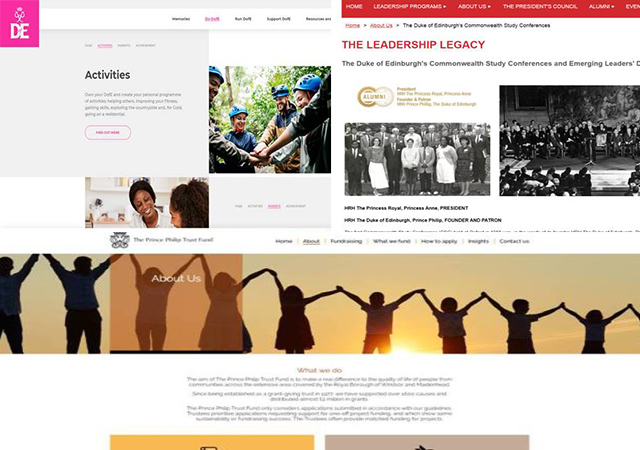 [Clockwise} Websites from the Duke of Edinburgh Awards, The Duke of Edinburgh Study Conferences and the Prince Philip Trust.
[Clockwise} Websites from the Duke of Edinburgh Awards, The Duke of Edinburgh Study Conferences and the Prince Philip Trust.
[This is an abridged version of an article in The Round Table: The Commonwealth Journal of International Affairs.]
Shortly before the body of the Duke of Edinburgh was laid in the vaults of St George’s Chapel, the Archbishop of Canterbury intoned a final farewell to the Prince and for his service to “Queen, Country and Commonwealth.”
Amid the huge outpouring of sometimes hyperbolic tributes at the Duke’s death, the Commonwealth is frequently mentioned but rarely explained. What therefore was the substance and nature of Philip’s Commonwealth contribution?
As the longest serving consort to the monarch is British history, there is a tendency for many to characterise the Duke’s achievements as deriving solely from the Queen’s service. He walked two paces behind her with dogged constancy, largely condemned to silence (apart from the occasional waspish comment, best interpreted as humorous). The islanders of Tanna, in Vanuatu (one of the smallest of the Commonwealth’s member nations) worshipped him as a god, with a passion undimmed by the passing of the decades or by his death. And yet he remained ‘Man belongs Mrs Queen’, his divinity overshadowed by a brighter star.
But however dutiful his role as a consort, Prince Philip demonstrated that he was also an innovator in his own right. Beneath his bluff exterior and his sometimes salty language was an avid reader and thinker and skilled linguist, wedded to the practical application of ideas. Many consider the Duke of Edinburgh’s Award scheme his most far-reaching initiative. Founded in the UK in 1956, it has become an integral part of what it is available to British secondary school students today, offering grades of personal challenge based on physical achievement, skills development and community service. Around 7 million young people in the UK have benefitted from the award since its inception. The award has also developed internationally, in the Commonwealth and beyond, now operating in around 130 countries and territories.
Rather less known was his initiative for periodic Commonwealth Study Conferences. The first of these was hosted in Oxford in 1956 and subsequent conferences have taken place in Canada, Australia, India, Malaysia, and the UK. The original purpose of the gathering focussed on bridging the divide between industry and community and drew from a rather older demographic, of young Commonwealth professionals across the public, private and voluntary sectors. These Study conferences were weighty affairs, involving 300 participants in a residential conference for a period of two weeks. Their purpose was not to generate voluminous communiques and high-sounding statements but to “challenge … assumptions and prejudices.” Substantial costs were involved, and the conferences were somewhat infrequent, even as their original purpose was overtaken by dramatic changes in work and technology. Nevertheless, the Study Conference initiative has spawned a range of dialogue events for emerging leaders across various Commonwealth countries and regions, with Princess Anne and Prince Edward now closely involved. The eleventh Study Commonwealth Conference will take place in Canada in 2023.
Prince Philip’s belief in dialogue, leadership and the search for wisdom, including with a more moral and religious focus, was also reflected in his foundation – with the then Dean of Windsor, Robin Woods – of St George’s House, in the grounds of Windsor Castle.
More could be said, not least on the Duke’s environmental work and synergies with the Commonwealth’s early recognition of the existential challenge of climate change. In sum, however, if the Prince was an unlikely god and chafed at the merely symbolic, the Commonwealth is not alone in greatly benefitting from the practical application of his energy and vision.
Stuart Mole is a member of the Round Table Editorial Board.



